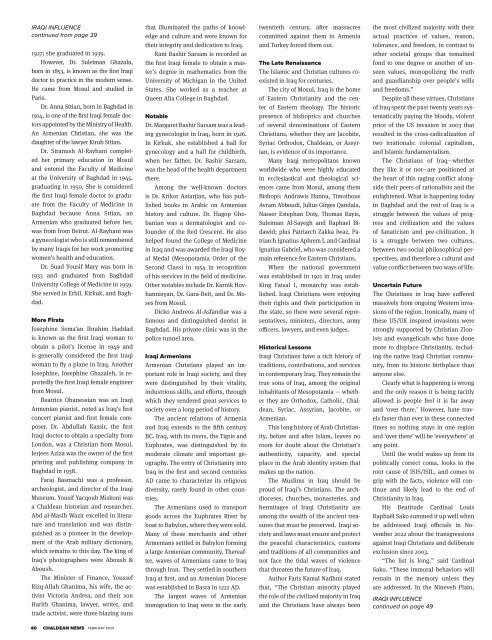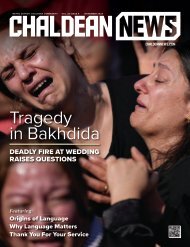Create successful ePaper yourself
Turn your PDF publications into a flip-book with our unique Google optimized e-Paper software.
IRAQI INFLUENCE<br />
continued from page 39<br />
1927; she graduated in 1939.<br />
However, Dr. Suleiman Ghazala,<br />
born in 1853, is known as the first Iraqi<br />
doctor to practice in the modern sense.<br />
He came from Mosul and studied in<br />
Paris.<br />
Dr. Anna Sttian, born in Baghdad in<br />
1914, is one of the first Iraqi female doctors<br />
appointed by the Ministry of Health.<br />
An Armenian Christian, she was the<br />
daughter of the lawyer Kirub Sttian.<br />
Dr. Siranush Al-Rayhani completed<br />
her primary education in Mosul<br />
and entered the Faculty of Medicine<br />
at the University of Baghdad in 1945,<br />
graduating in 1950. She is considered<br />
the first Iraqi female doctor to graduate<br />
from the Faculty of Medicine in<br />
Baghdad because Anna Sttian, an<br />
Armenian who graduated before her,<br />
was from from Beirut. Al-Rayhani was<br />
a gynecologist who is still remembered<br />
by many Iraqis for her work promoting<br />
women’s health and education.<br />
Dr. Suad Yousif Mary was born in<br />
1933 and graduated from Baghdad<br />
University College of Medicine in 1959.<br />
She served in Erbil, Kirkuk, and Baghdad.<br />
More Firsts<br />
Josephine Sema’an Ibrahim Haddad<br />
is known as the first Iraqi woman to<br />
obtain a pilot’s license in 1949 and<br />
is generally considered the first Iraqi<br />
woman to fly a plane in Iraq. Another<br />
Josephine, Josephine Ghazaleh, is reportedly<br />
the first Iraqi female engineer<br />
from Mosul.<br />
Beatrice Ohanessian was an Iraqi<br />
Armenian pianist, noted as Iraq’s first<br />
concert pianist and first female composer.<br />
Dr. Abdullah Kassir, the first<br />
Iraqi doctor to obtain a specialty from<br />
London, was a Christian from Mosul.<br />
Jerjees Aziza was the owner of the first<br />
printing and publishing company in<br />
Baghdad in 1938.<br />
Faraj Basmachi was a professor,<br />
archeologist, and director of the Iraqi<br />
Museum. Yousif Yacqoub Miskoni was<br />
a Chaldean historian and researcher.<br />
Abd al-Masih Wazir excelled in literature<br />
and translation and was distinguished<br />
as a pioneer in the development<br />
of the Arab military dictionary,<br />
which remains to this day. The king of<br />
Iraq’s photographers were Aboush &<br />
Aboush.<br />
The Minister of Finance, Youssef<br />
Rizq-Allah Ghanima, his wife, the activist<br />
Victoria Andrea, and their son<br />
Harith Ghanima, lawyer, writer, and<br />
trade activist, were three blazing suns<br />
that illuminated the paths of knowledge<br />
and culture and were known for<br />
their integrity and dedication to Iraq.<br />
Rani Bashir Sarsam is recorded as<br />
the first Iraqi female to obtain a master’s<br />
degree in mathematics from the<br />
University of Michigan in the United<br />
States. She worked as a teacher at<br />
Queen Alia College in Baghdad.<br />
Notable<br />
Dr. Margaret Bashir Sarsam was a leading<br />
gynecologist in Iraq, born in 1926.<br />
In Kirkuk, she established a hall for<br />
gynecology and a hall for childbirth,<br />
when her father, Dr. Bashir Sarsam,<br />
was the head of the health department<br />
there.<br />
Among the well-known doctors<br />
is Dr. Krikor Astarjian, who has published<br />
books in Arabic on Armenian<br />
history and culture. Dr. Hagop Ghobanian<br />
was a dermatologist and cofounder<br />
of the Red Crescent. He also<br />
helped found the College of Medicine<br />
in Iraq and was awarded the Iraqi Royal<br />
Medal (Mesopotamia Order of the<br />
Second Class) in 1954 in recognition<br />
of his services in the field of medicine.<br />
Other notables include Dr. Karnik Hovhannisyan,<br />
Dr. Gara-Beit, and Dr. Moses<br />
from Mosul.<br />
Dicko Andreos Al-Asfandiar was a<br />
famous and distinguished dentist in<br />
Baghdad. His private clinic was in the<br />
police tunnel area.<br />
Iraqi Armenians<br />
Armenian Christians played an important<br />
role in Iraqi society, and they<br />
were distinguished by their vitality,<br />
industrious skills, and efforts, through<br />
which they rendered great services to<br />
society over a long period of history.<br />
The ancient relations of Armenia<br />
and Iraq extends to the fifth century<br />
BC. Iraq, with its rivers, the Tigris and<br />
Euphrates, was distinguished by its<br />
moderate climate and important geography.<br />
The entry of Christianity into<br />
Iraq in the first and second centuries<br />
AD came to characterize its religious<br />
diversity, rarely found in other countries.<br />
The Armenians used to transport<br />
goods across the Euphrates River by<br />
boat to Babylon, where they were sold.<br />
Many of these merchants and other<br />
Armenians settled in Babylon forming<br />
a large Armenian community. Thereafter,<br />
waves of Armenians came to Iraq<br />
through Iran. They settled in southern<br />
Iraq at first, and an Armenian Diocese<br />
was established in Basra in 1222 AD.<br />
The largest waves of Armenian<br />
immigration to Iraq were in the early<br />
twentieth century, after massacres<br />
committed against them in Armenia<br />
and Turkey forced them out.<br />
The Late Renaissance<br />
The Islamic and Christian cultures coexisted<br />
in Iraq for centuries.<br />
The city of Mosul, Iraq is the home<br />
of Eastern Christianity and the center<br />
of Eastern theology. The historic<br />
presence of bishoprics and churches<br />
of several denominations of Eastern<br />
Christians, whether they are Jacobite,<br />
Syriac Orthodox, Chaldean, or Assyrian,<br />
is evidence of its importance.<br />
Many Iraqi metropolitans known<br />
worldwide who were highly educated<br />
in ecclesiastical and theological sciences<br />
came from Mosul, among them<br />
Bishops: Andrawis Hanna, Timothous<br />
Avram Abboudi, Julius Girges Qandala,<br />
Nasser Estephan Doiy, Thomas Rayis,<br />
Suleiman Al-Sayegh and Raphael Bidawid;<br />
plus Patriarch Zakka Iwaz, Patriarch<br />
Ignatius Aphrem I, and Cardinal<br />
Ignatius Gabriel, who was considered a<br />
main reference for Eastern Christians.<br />
When the national government<br />
was established in 1921 in Iraq under<br />
King Faisal I, monarchy was established.<br />
Iraqi Christians were enjoying<br />
their rights and their participation in<br />
the state, so there were several representatives,<br />
ministers, directors, army<br />
officers, lawyers, and even judges.<br />
Historical Lessons<br />
Iraqi Christians have a rich history of<br />
traditions, contributions, and services<br />
in contemporary Iraq. They remain the<br />
true sons of Iraq, among the original<br />
inhabitants of Mesopotamia — whether<br />
they are Orthodox, Catholic, Chaldean,<br />
Syriac, Assyrian, Jacobite, or<br />
Armenian.<br />
This long history of Arab Christianity,<br />
before and after Islam, leaves no<br />
room for doubt about the Christian’s<br />
authenticity, capacity, and special<br />
place in the Arab identity system that<br />
makes up the nation.<br />
The Muslims in Iraq should be<br />
proud of Iraqi’s Christians. The archdioceses,<br />
churches, monasteries, and<br />
hermitages of Iraqi Christianity are<br />
among the wealth of the ancient treasures<br />
that must be preserved. Iraqi society<br />
and laws must ensure and protect<br />
the peaceful characteristics, customs<br />
and traditions of all communities and<br />
not face the tidal waves of violence<br />
that threaten the future of Iraq.<br />
Author Faris Kamal Nadhmi stated<br />
that, “The Christian minority played<br />
the role of the civilized majority in Iraq<br />
and the Christians have always been<br />
the most civilized majority with their<br />
actual practices of values, reason,<br />
tolerance, and freedom, in contrast to<br />
other societal groups that remained<br />
fond to one degree or another of unseen<br />
values, monopolizing the truth<br />
and guardianship over people’s wills<br />
and freedoms.”<br />
Despite all these virtues, Christians<br />
of Iraq spent the past twenty years systematically<br />
paying the bloody, violent<br />
price of the US invasion in 2003 that<br />
resulted in the cross-radicalization of<br />
two irrationals: colonial capitalism,<br />
and Islamic fundamentalism.<br />
The Christians of Iraq—whether<br />
they like it or not—are positioned at<br />
the heart of this raging conflict alongside<br />
their peers of rationalists and the<br />
enlightened. What is happening today<br />
in Baghdad and the rest of Iraq is a<br />
struggle between the values of progress<br />
and civilization and the values<br />
of fanaticism and pre-civilization. It<br />
is a struggle between two cultures,<br />
between two social philosophical perspectives,<br />
and therefore a cultural and<br />
value conflict between two ways of life.<br />
Uncertain Future<br />
The Christians in Iraq have suffered<br />
massively from ongoing Western invasions<br />
of the region. Ironically, many of<br />
these US/UK inspired invasions were<br />
strongly supported by Christian Zionists<br />
and evangelicals who have done<br />
more to displace Christianity, including<br />
the native Iraqi Christian community,<br />
from its historic birthplace than<br />
anyone else.<br />
Clearly what is happening is wrong<br />
and the only reason it is being tacitly<br />
allowed is people feel it is far away<br />
and ‘over there.’ However, hate travels<br />
faster than ever in these connected<br />
times so nothing stays in one region<br />
and ‘over there’ will be ‘everywhere’ at<br />
any point.<br />
Until the world wakes up from its<br />
politically correct coma, looks to the<br />
root cause of ISIS/ISIL, and comes to<br />
grip with the facts, violence will continue<br />
and likely lead to the end of<br />
Christianity in Iraq.<br />
His Beatitude Cardinal Louis<br />
Raphaël Sako summed it up well when<br />
he addressed Iraqi officials in November<br />
2022 about the transgressions<br />
against Iraqi Christians and deliberate<br />
exclusion since 2003.<br />
“The list is long,” said Cardinal<br />
Sako. “These immoral behaviors will<br />
remain in the memory unless they<br />
are addressed. In the Nineveh Plain,<br />
IRAQI INFLUENCE<br />
continued on page 49<br />
40 CHALDEAN NEWS <strong>FEBRUARY</strong> <strong>2024</strong>
















